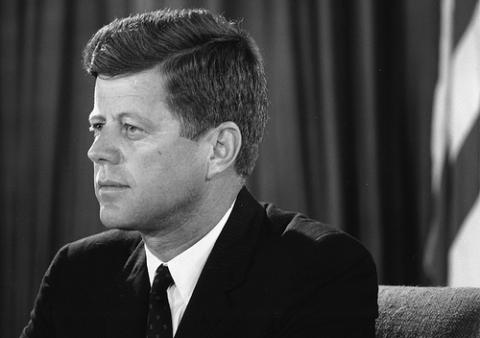Brinkmanship that almost caused Armageddon

John F. Kennedy brought the world to the brink of a nuclear holocaust over the placement of missiles in Cuba which, he acknowledged privately, made no difference to American security. By Vincent Browne.
Today, I want to overlook the great issues of our time: the forthcoming austerity budget; the jailing of one of our foremost business icons; the bank debt that is not ours; the shame of Angela Merkel's commendation that our austerity makes Europe stronger.
I even wish to ignore the outrageously disproportionate 96-week ban imposed by a GAA county board on a conscientious father, who had merely remonstrated with a Newcastle West player for annoying his son, who had been playing for Broadford-Dromcollogher in the Limerick football final championship on 21 October. (The game ended in a draw and Broadford-Drum won the replay, which just proves my point.)
Instead, I wish to focus on an incident that occurred 50 years ago that brought the world to the edge of annihilation, primarily over the anxiety of an American president more concerned with what would appear to be a change in the strategic balance of power and his poll ratings in the United States - than with the survival of humankind. That was John F Kennedy.
Kennedy had fought (and, arguably, won) the 1960 presidential election against Richard Nixon on the spurious claim that the Soviet Union had attained a large nuclear missile advantage over the US, when the opposite was true.
In 1961, the first year of Kennedy's presidency, the US had 170 intercontinental ballistic missiles (ICBMs), while the USSR had only four. The US had 27,000 nuclear warheads, the USSR 3,500. But four ICBMs fitted with nuclear warheads would have been sufficient to devastate a large part of the United States, and these could have been fired from inside the USSR, at a time when there were no anti-ballistic missile defences.
In addition, in April 1962, the US had placed medium-range ballistic missiles (MRBM) in Turkey, aimed at the Soviet Union, so the imbalance in nuclear capacity was enormous and hugely in favour of the US.
Soviet leader Nikita Khrushchev thought he could even out this balance somewhat - and inexpensively - by placing missiles in Cuba which, in 1959, had become a communist ally when Fidel Castro overthrew the dictator Fulgencio Batista.
There were other reasons for placing the missiles on Cuba. Khrushchev calculated that doing so would give him a tactical advantage over Kennedy in dealing with the then "hot" issue in the Cold War: Berlin.
The control of West Berlin by the Western powers was proving greatly destabilising to the state of East Germany, and Khrushchev considered East Germany a central bulwark in the communist bloc.
There was also the consideration that, within a few months of coming into office, Kennedy had backed an attempt to overthrow Castro, and there was a realistic apprehension that, following the failure of that endeavour, the Americans would launch a full-scale invasion of Cuba.
So, with the reluctant agreement of Castro - who was determined not to allow Cuba to become a puppet of the Soviet Union - medium-range missiles began to be placed surreptitiously in Cuba in September 1962.
This became known to the Kennedy administration on 15 October, 1962, and then began a showdown, which people everywhere believed would mean the end of the world.
On learning of the placement of missiles on the morning of 16 October, Kennedy summoned a meeting of advisers and senior officials. There was an inconclusive discussion. The meeting adjourned, but convened again at 6.30pm in the cabinet room.
The covert tapes (arranged by Kennedy) of the conversations concerning the Cuban missile crisis became available some years ago, and the transcripts were published, in 'The Kennedy Tapes: Inside the White House During the Cuban Missile Crisis', edited by Ernest May and Philip Zelikov.
On page 89 of this book, the following exchange is recorded between McGeorge Bundy and Robert McNamara. Bundy was the national security adviser, while McNamara was the Secretary of State for Defense.
Bundy: "What is the strategic impact on the position of the United States of MRBMs in Cuba? How gravely does this change the strategic balance?"
McNamara: "I asked the Chiefs [of Staff of the Defence Forces] that this afternoon, in effect, and they said: 'Substantially'. My own personal view is not at all."
Marshall Carter, deputy director of the Central Intelligence Agency, said the CIA had assumed the Soviet Union would not place MRBMs in Cuba because it did not improve the strategic balance for the Soviet Union (page 90).
Kennedy himself intervened in the debate to say: "It makes them look like they're co-equal with us" (page 91).
Later, he said: "What difference does it make? They've got enough to blow us up anyway. I think it's just a question of... After all, this is just as much of a political struggle as much as a military [one]" (page 92).
Kennedy ordered a blockade of Cuba and, after a few very tense days (during which people all around the world believed they were going to die, including Kennedy's immediate family), Khrushchev backed down on the conclusion of a secret deal, whereby the US missiles in Turkey were withdrawn.
But, essentially, Kennedy brought the world to the brink of a nuclear holocaust over the placement of missiles in Cuba which, he acknowledged privately, made no difference to American security, but was merely a political problem.
Even the Limerick county board would not be that rash.
Image top: US Embassy New Dehli.
